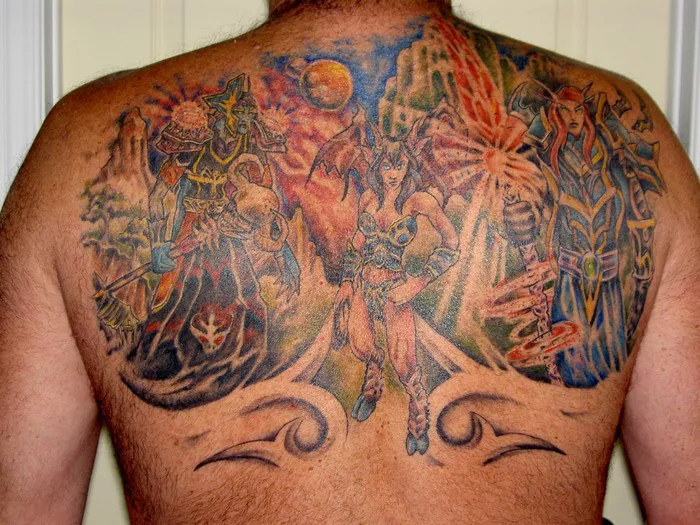The mystique surrounding the Yakuza, Japan’s notorious organized crime syndicates, has captivated imaginations worldwide. With a history dating back to at least the 19th century, these groups are deeply entrenched in Japanese society, commanding fear and respect in equal measure. Among the many facets of Yakuza culture, one that stands out prominently is the distinctive style of tattoos worn by its members.
Yakuza tattoos, known as irezumi, are not merely decorative body art; they serve as symbols of allegiance, identity, and status within the underworld. These intricate designs, often covering the entire body from shoulders to legs, form what is colloquially referred to as the “Yakuza bodysuit.” Far from mere adornments, these tattoos are steeped in meaning and symbolism, reflecting elements of Japanese mythology, history, and personal narratives.
Meaning and Symbolism:
For those within the Yakuza ranks, tattoos hold profound significance. They are more than just skin deep; they are visual testaments to a member’s commitment, resilience, and loyalty to the organization. Yakuza tattoos can vary widely in style and imagery, ranging from vibrant, colorful designs to intricate black outlines. However, what unites them is their comprehensive coverage of the body and their thematic focus on Japanese culture and folklore.
Each motif etched into the skin tells a story, conveying messages of strength, protection, and honor. Dragons, koi fish, and cherry blossoms are common motifs, each carrying its own symbolism within Japanese culture. These tattoos are not only a reflection of personal identity but also serve as a form of intimidation, signaling one’s affiliation with a powerful and feared criminal organization.
Historical Origins:
To understand the significance of Yakuza tattoos, one must delve into the origins of the Yakuza themselves. While the precise origins of these criminal syndicates remain shrouded in mystery, they are believed to have emerged from marginalized segments of society, including gamblers, street merchants, and ronin (masterless samurai). The term “Yakuza” itself is said to derive from a losing hand in a traditional Japanese card game, symbolizing the adversity and struggle faced by its members.
As Yakuza groups evolved, so too did their distinctive visual identity. In the early days, tattoos served as marks of solidarity among gang members, distinguishing them from the rest of society. However, as law enforcement crackdowns intensified and societal attitudes toward tattoos shifted, Yakuza members began concealing their ink under the guise of respectability. Today, the stereotypical image of the Yakuza member is not one adorned with tattoos but rather a nondescript businessman hiding his true affiliations.
Tattooing Process and Pain:
The process of acquiring a Yakuza tattoo is not for the faint of heart. Traditional irezumi is performed painstakingly by skilled artists known as horishi, who meticulously handcraft each design using time-honored techniques. Employing wooden handles, metal needles, and specially formulated ink, these artists labor for hours on end, transforming flesh into living canvases of art.
The act of getting tattooed is as much a rite of passage as it is a physical ordeal. Yakuza members believe that enduring the pain and discomfort of the tattooing process demonstrates one’s resolve and commitment to the organization. Larger and more elaborate tattoos are seen as badges of honor, signifying one’s status within the hierarchy.
Covering Tattoos in Public:
Despite their cultural significance within the Yakuza subculture, tattoos are not openly displayed. In Japan, where conformity and adherence to societal norms are highly valued, visible tattoos carry a stigma that dates back centuries. While attitudes toward body art have softened in recent years, thanks in part to global influences, tattoos are still associated with criminality and deviance in the eyes of many.
For Yakuza members, maintaining a low profile is essential for survival. Visible tattoos not only draw unwanted attention but also invite scrutiny from law enforcement and rival gangs. As a result, Yakuza members go to great lengths to conceal their ink in public, often resorting to clothing or bandages to mask their true identities.
Legal Status:
The legality of Yakuza tattoos in Japan is a complex and nuanced issue. While tattoos themselves are not inherently illegal, their association with organized crime has led to widespread discrimination and social ostracization. The Japanese government does not officially recognize tattooing as a legitimate form of artistic expression, further fueling the negative perception surrounding them.
In recent years, efforts have been made to challenge these perceptions and promote greater acceptance of tattoos in Japanese society. However, progress has been slow, and deeply ingrained attitudes toward body art persist. In many public spaces, including onsens (hot springs) and gyms, individuals with visible tattoos are still barred from entry, a policy rooted in fears of Yakuza infiltration.
Conclusion:
The question of whether it is illegal to have a Yakuza tattoo is not a straightforward one. Legally speaking, there is no statute that explicitly prohibits the possession of such tattoos. However, the societal and cultural implications of wearing them cannot be ignored. For those within the Yakuza ranks, tattoos are badges of honor, symbols of loyalty and dedication to a way of life. But for the rest of society, they remain potent reminders of a criminal underworld that operates in the shadows.
As Japan grapples with shifting attitudes toward tattoos and the legacy of the Yakuza, the debate surrounding their legality and legitimacy continues to evolve. While some may view Yakuza tattoos as relics of a bygone era, others see them as enduring symbols of defiance and identity. Ultimately, the question of legality is secondary to the deeper cultural and social significance that these tattoos hold for those who wear them.

